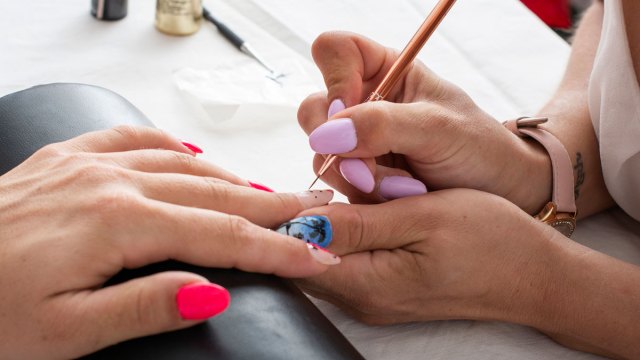“Our research suggests that engaging in salon nail care, coupled with light self-disclosure, can provide a positive boost to one’s psychological state,” researchers said
It doesn’t seem like a stretch to say that self-care (in just about any form) is good for our mental health. But now we have actual scientific research to back that up—a new study, published in the scientific journal Frontiers in Psychology, showed that getting a manicure, either at home or in a salon, can boost positive emotions and relaxation for women. When they engage in some personal sharing (like salon chair gossip) during the mani, the psychological effects are even greater. So here’s your sign to book that mani-pedi this week.
Study participants were Japanese women whose ages ranged from early 20s to late 30s. In online surveys, they answered questions about their nail care habits, including whether they went to nail salons, did at-home manicures, or neither. They were also asked to rate different emotions and attitudes they experienced during nail care sessions.
To learn even more, researchers asked those who visited nail salons to rate how much they discussed their hobbies, daily life, difficult experiences, disadvantages, weaknesses, and negative personality traits with their manicurists.
After analyzing all of the survey results, the researchers found that nail care had an overall positive effect on the participants’ emotions, relaxation, and well-being. Those who visited salons experienced more significant effects, and those who superficially self-disclosed about their lives to their manicurists got the biggest psychological benefits out of all the participants. Women who went too deep in a “nails-as-therapy” sort of way actually negated any kind of mental pick-me-up.
“Our research suggests that engaging in salon nail care, coupled with light self-disclosure, can provide a positive boost to one’s psychological state,” study author Atsushi Kawakubo told PsyPost. “This practice offers a tangible way for individuals to promote their mental well-being, emphasizing the importance of self-care and the potential benefits of sharing personal thoughts in a comfortable setting.”
There are a few caveats, of course. This study didn’t include a control group, so it’s hard to make a direct comparison between the participants and any other populations. It was also limited to Japanese women living in metropolitan areas, so it’s not clear if the same benefits would apply in other cultural contexts.
“In contemporary times, an increasing number of both males and females show a growing interest in beauty, with a rising number of individuals engaging in nail art practices,” Kawakubo said. “While this study exclusively focused on women, we intend to conduct future research that includes men as well.”
But even with the limitations, it’s promising research that just makes sense—self-care should have psychological benefits and be practiced more regularly. “Engaging in activities that allow individuals to relax, reflect, and self-disclose can be a valuable component of maintaining good mental health,” Kawakubo said.
